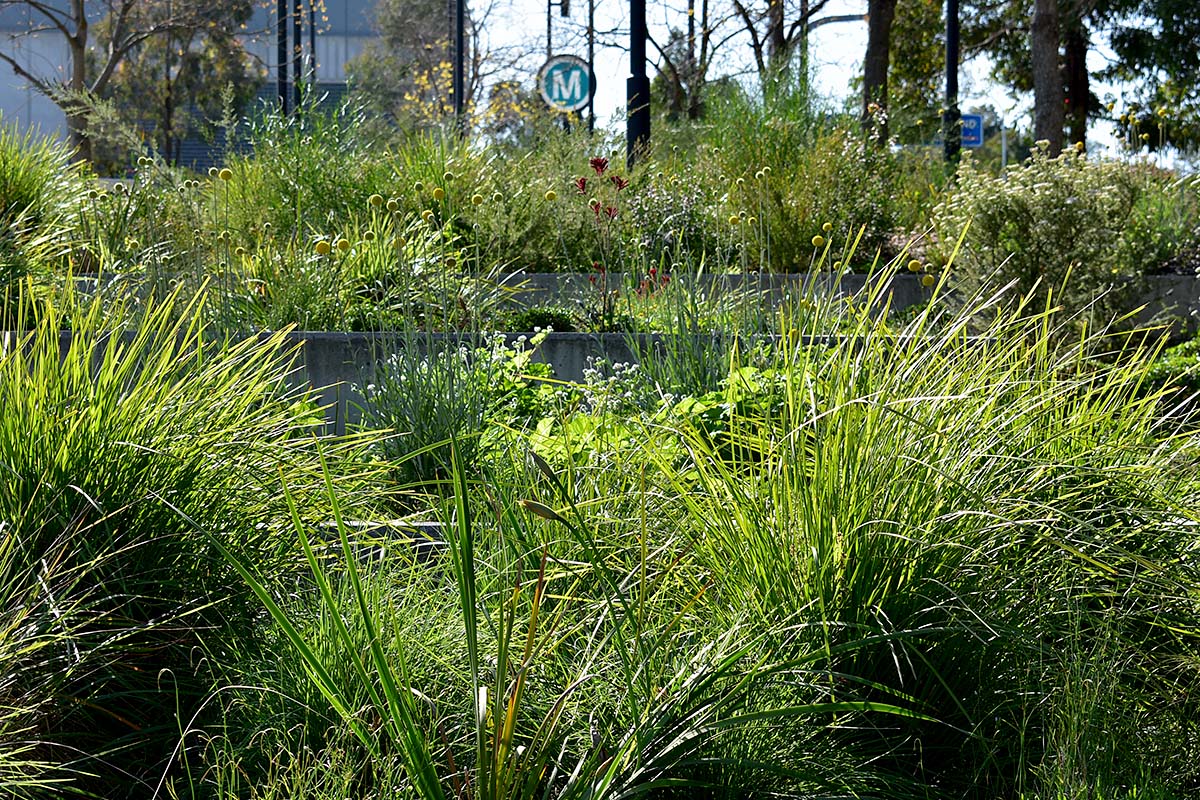Biodiversity in Place webinar series
Join us for a webinar series exploring the Government Architect NSW Biodiversity in Place Framework, a practical guide to bring nature back into our cities, towns and suburbs. Gain the knowledge and insights to apply the framework in your own projects.
You’ll hear from those who shaped the framework, including the design and project teams behind case study projects. We will look at where the framework has already been used and explore the opportunities and challenges in applying it.
Webinar 1 – Designing with nature
Showground Metro planting trials
This project trialled different plants to create a vibrant display and habitat at the Hills Showground. Sydney Metro, Hassell and the University of Melbourne worked together to transform 1,000 m2 of the Hills Showground Metro urban plaza with over 100 plant species, creating a place for people and pollinators to enjoy. The design focused on a natural layout to improve habitat, reduce upkeep and provide longer flowering seasons to support pollinators.
Camden Council’s Green and Blue Grid Vision
Camden Council’s recently adopted Green and Blue Grid Vision has supported a whole-of-council approach to address biodiversity in urban environments. Collaboration and partnerships across council has enabled nature positive responses in the public domain – with pocket parks, reserves, car parks, creek corridors and plans to build a new community nursery to help supply locally grown native plants. Camden is a wonderful example of what can be achieved when strategy is put into action.
Melbourne Pollinator Corridor
This community initiative, led by Heartscapes creates habitats for pollinators. The program encourages people and groups to help protect biodiversity and promote sustainable gardens across Melbourne.
The initiative has united residents, schools and local groups to build over 70 street gardens, plant more than 8,000 plants and distribute over 600 plants that attract pollinators. This grassroots project promotes social interaction, environmental care, and a stronger connection to nature.
Jon Hazelwood
Showground Metro planting trials
Jon is an expert in designing complex public spaces, with a unique ability to merge local and global perspectives. His recent work focuses on urban biodiversity, leading innovative projects that make cities lively for people and pollinators. He co-authored the Government Architect NSW Biodiversity in Place Framework and is applying these ideas to the redevelopment of Melbourne’s Arts Precinct.
Kerri-Ann Barry, Carmel Hamilton and Tim Vyse
Camden Council’s Green and Blue Grid Vision
With extensive backgrounds in local government, Kerri-Ann, Carmel and Tim were instrumental in writing and implementing The Camden Green and Blue Grid Vision. Kerri-Ann’s work centres on urban planning and community development, Carmel leads sustainability efforts, and Tim brings a landscape-led approach to public space design. Their combined expertise and collaboration with other council officers has helped guide Camden Council's approach to building liveable and sustainable communities.
Emma Cutting
Melbourne Pollinator Corridor
Emma is the founder and CEO of Heartscapes, an environmental charity in Melbourne that works to make urban areas better for people and nature. Emma designed and is now leading the creation of the Melbourne Pollinator Corridor. She has written and self-published the Melbourne Pollinator Corridor Handbook and been featured in numerous publications.
Webinar 2 – Nature in the city
Hosted by the Australian Institute of Landscape Architects, this session explores the importance of collaboration in designing and maintaining biodiverse public spaces. We’ll share practical examples from different urban settings, like backyards, rooftops, urban plazas and riverside parks.
